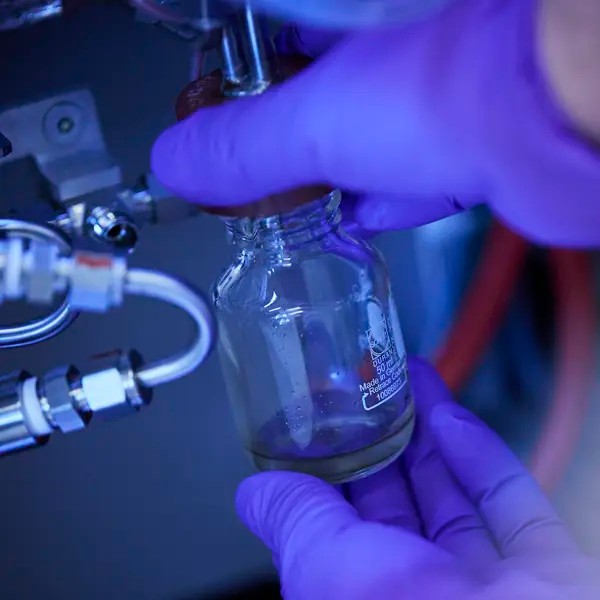
For two days at the end of November 2023, around eighty chemistry teachers from all over Sweden met at Chalmers University of Technology to share knowledge, learn more about current research, and listen to inspirational lectures. How young people can be attracted to the field and subject chemistry and the industry's need for Chemical engineers was on top of the agenda.
chemistry and the industry's need for Chemical engineers was on top of the agenda.
Every year, training days are arranged for chemistry teachers in primary and upper secondary school. This year, the event was held at Chalmers in collaboration with the Swedish Chemical Society, the National Committee for Chemistry and the Chemistry Teachers' Resource Centre. In addition to exchanging knowledge and listening to lectures, the teachers did experiments in the lab together with doctoral students from the department. The program was focused on sustainable chemistry and the importance of increasing children and young peoples´ interest in chemistry.
Right before the program begins, a scene unfolds in the entrance hall of the Chemistry Building at Chalmers, serving as a practical demonstration of the theme of the training days - to encourage more young people to pursue further education in chemistry. A young girl studying chemical engineering is waiting for her chemistry teacher from upper secondary school, who she has heard is among the participants. The reunion looks very happy when they meet. It turns out that the same teacher has several former students studying chemical engineering at Chalmers. This teacher seems to have succeeded in raising an interest and creating a positive atmosphere around chemistry during her lessons. The event spreads as an energizing inspirational story among the participants.
The industry needs chemical engineers
To meet the increasing need for chemical engineers, more young people must be stimulated to continue with a higher education in chemical engineering after primary and upper secondary school. In the Gothenburg region alone, around a dozen green industrial investments are planned within the next few years in the fossil-free product and manufacturing industry, which will require many trained chemical technicians. The industry’s own role in the energy and materials transition was emphasized by the invited industry representatives from, among others, Northvolt, Perstorp and Astra Zeneca. That fact that the need for engineers in chemistry is great, was also made clear by Helene Stenson from Teknikcollege and the Gothenburg region.

Photographer: Daniel Stahre
The chemistry teacher: show the good aspects of chemistry
Linda Stollenwerk works as a chemistry teacher at Gothenburg Technical College. She emphasizes the importance of demonstrating the benefits to the students.
“I don't think the companies in the chemical industry are that visible to the students and that they have a reputation that is still connected to things like oil, poison, and fossil fuels. It might not be that clear that chemistry is also related to medicine and food, like the development of non-meet food. If we don´t show how chemistry can be used in a good way, it won’t feel like an industry of the future. And she shares concrete advice to get young people interested in chemistry.
“We can create an interest in chemistry if we manage to introduce chemistry as a part of everything around us in the lesson material. For example, instead of only reading about chemical bonds we could talk about how that is related to the development of successful cancer drugs”

Photographer: Daniel Stahre
Sustainability integrated in the teaching
“Absolutely. There is plenty of room for interpretation for us. I see how we can pick more examples from the term Green Chemistry and put it under sustainable development in the materials. It is important for us to keep up the dialogue with about sustainable development with chemistry teacher, to make sure that the content of Liber's learning materials is adapted to everyday life in the classroom. What we are also looking at is whether we can produce more tailer-made material for individual programs, to make it more accessible to the individual student”
Cooperation as a key issue for the future
Collaborations with schools in development

